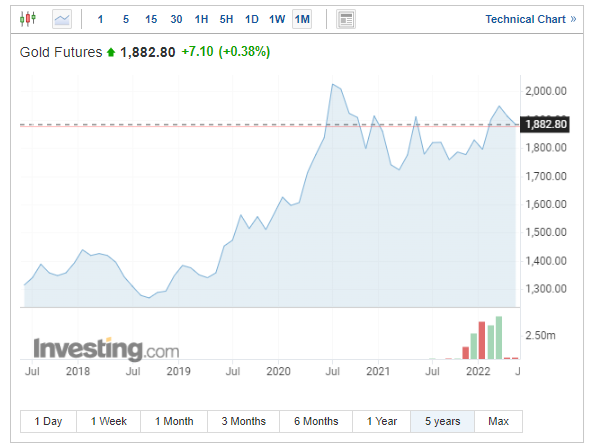Demand for gold is currently being supported mainly by the rapid rise in inflation and the uncertainty associated with the conflict in Ukraine, which continues to persist and does not leave investors around the world calm. They are encouraged to purchase because of concerns about the future development of the war between Moscow and Kiev, which is driving them to diversify their risk and include the precious metal in their portfolios, which is one of the safe havens during turbulent periods in the markets. After the sell-offs that have occurred in the capital markets since the outbreak of the war, it is not surprising that investors are looking for ways to protect their investments from downturns.
We can see that there has been a particular increase in interest in ETFs with a focus on investments in gold, which have seen the largest inflows since Q3 2020. The total volume of funds held in gold funds in this way has increased by 269 tonnes year-on-year, surpassing the outflow period that occurred in 2021 in a volume of 174 tons over 12 months.
In terms of investment in physical metal, gold purchases in the form of coins and gold bars reached 282 tonnes in the first three months of the year, down by a fifth in comparison to last year. The reason for the decline is the lockdowns associated with the COVID-19 pandemic in China and high prices in Turkey due to the extreme devaluation of the Turkish lira (due to high inflation in the country). However, looking at the five-year quarterly average, the result is 11 percent higher.
Sales of gold jewellery in China and India also saw a decline in interest. Restrictions related to the aforementioned coronavirus in China are expected to hamper interest in buying jewellery, coins as well as gold bars in the coming months, according to experts.
Central banks also increased their gold reserves, adding 84 tonnes of gold in the first quarter of the year. Compared to the previous period, purchases of the precious metal roughly doubled. On the other hand, purchases fell by 29 per cent compared to the same period in 2021.
As for demand in the technology sector, where gold is used to make electronics, Q1 was the highest since 2018.
Overall, metal production rose to 856 tonnes during the period. The volume of supplies of recycled commodity increased by 15 percent year on year to 310 tonnes. Looking at the first quarters of the last 6 years, this is the maximum.
Given the continuing uncertainty in global markets, we can also see the price of gold rising on the stock exchange. At the end of last week, the futures contract price was around US$1,880 per ounce, while earlier this year the price was around US$1,730 per ounce, and looking over five years we can see a 46 per cent increase in value from US$1,290 per ounce to the current price. However, it is still quite far from its highs in July 2020, when it broke the $2,000 per ounce mark.*

Development of the value of gold futures over the last 5 years. (Investing.com)
[1] Forward-looking statements are based on assumptions and current expectations, which may be inaccurate, or on the current economic environment, which may change. Such statements are not guarantees of future performance. They involve risks and other uncertainties that are difficult to predict. Results may differ materially from those expressed or implied by any forward-looking statements.
* Past performance is not a guarantee of future results.